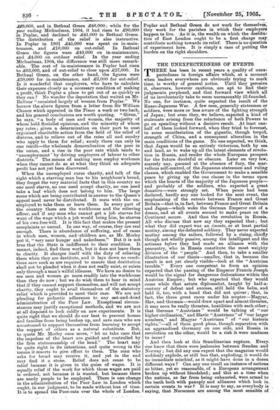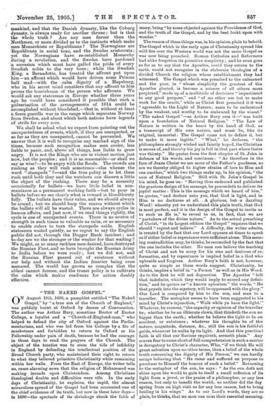And then look at this Scandinavian rupture. Every, One knew
that there were jealousies between Sweden- and Norway ; but did any one expect that the magazine would. suddenly explode, or still less that, exploding, it would,do no immediate mischief, as it might have done in a dozen different ways ? Can any one recall an instance of nations so bitter, yet so reasonable, of a European arrangement broken up without bloodshed; and this at a time when the nations, so far from being exhausted, were armed to the teeth both with panoply and alliances which look in. certain events to war ? It is easy to say, as everybody is saying, that Norsemen are among the most sensible of
mankind, and that the Danish dynasty, like the Coburg dynasty, is always ready for another throne ; but is that the whole, truth ? Are any men fiercer than the Iforthmen, or more divided as to the instincts which make men Monarchists or Republicans ? The Norwegians are Republicans in social tone, and the Swedes aristocrats ; yet the Norwegians have re-established Monarchy during a revolution, and the Swedes have pardoned a secession which must have galled the pride of every Swedish noble to the very bone ; while the Swedish King, a Bernadotte, has treated the affront put upon him — an affront which would have driven some Princes half mad—with the calm dignity of a Hapsburg, who in his secret mind considers that any affront to hint proves the boorishness of the person who affronts. We Would ask any statesman in Europe whether three years ago he would have considered it possible that such a pulverisation of the arrangements of 1814 could be accomplished without bloodshed,—that is, without at least a fierce guerilla war in the range which separates Norway from Sweden, and about which both nations have legends of strife for every acre.
We shall, be asked what we expect from pointing out the unexpectedness of events, which, if they are unexpected, or BO far as they are unexpected, cannot be prevented. We answer that it is well to recognise any marked sign of the times, because such recognition makes men cooler, less liable to panic, and, above all things, less liable to grow angry. It is not the Kings who are in violent motion just now; but the peoples ; and it is as reasonable—or shall we say as wise P—to be angry with the floods. The crowds are rushing as they will rush sometimes—else whence the word " stampede " P—and the true policy is to let them rush until both they and the watchers can discern a little the object of the rushing. There may be a necessity occasionally for bullets—we have little belief in non- resistance as a permanent working faith—but to pour in bullets before we see clearly what is toward is bloodthirsty folly. The bullets have their value, and we should always be armed ; but we should keep the reason without which the bullets will all be wasted. There are always cycles in human affairs, and just now, if we read things rightly, the cycle is one of unexpected events. There is no source of strength in such times so valuable as calm, or so necessary to enable rulers to turn the stampede aside. English statesmen waited quietly, as we regret to say the English public did not, through the Dogger Bank incident ; and to-day are we the stronger or the weaker for that waiting ?, We might, as so many reckless men desired, have destroyed the Russian Fleet, and so have.brought the Russian Army to .India before we, were ready ; but we did not, and the Russian Fleet passed out of existence without our help and without the Indian frontier being even menaced. The world has grown so complex that the ablest cannot foresee, and the truest policy, is to cultivate the calm which makes readiness for action doubly effective.
"THE NAKED GOSPEL."
ON August 19th, 1690, a pamphlet entitled "The Naked Gospel," by "a true son of the Church of England," was publicly burnt at Oxford by decree of Convocation. The author was Arthur Bury, sometime Rector of Exeter College, a loyalist and a "Church-of-England-man," who helped to defend the city of Oxford against the Parlia- mentarians, and who was led from his College by a file of musketeers and forbidden to return to Oxford or his Fellowship under pain of death, because he had the courage in those days to read the prayers of the Church. The object of the treatise was to stem the tide of infidelity in England by defending the intellectual position of the Broad Church party, who maintained their right to return to what they believed primitive Christianity while remaining within her walls. From the East of Europe, the writer tells us, came alarming news that the religion of Mohammed was making inroads upon Christendom. Among Christians theological doubts and difficulties were rife. In the early days of Christianity, he explains, the rapid, the almost miraculous spread of the Gospel had been accounted one of the chief evidences of its truth, but now in these later days.— in 1690—the spectacle of its shrinkage shook the faith of
many, being "by some objected against the Providenoe of God, and the truth of the Gospel, and by the best lookt upon with wonder."





















































 Previous page
Previous page